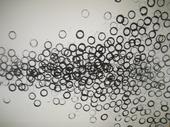In last month’s post, we traced the circular relationship between experience and the first principles of logic (the fundamental principles of rational thinking that define its scope and provide the foundation from which all its further truths are formed).
In short, in our tracing, we discovered that we use reason to create knowledge about and from our experiences, but experience provides the first principles of logic which govern reasoning. We can see there is a closed, self-perpetuating “loop” within this story, limited to these variables. Rather than find this revelation to be disconcerting, I find it to be a powerful discovery:
Our awareness of this circular relationship shows us that the “truth” of our intellectual and sensual perceptions is dependent on what I make of it all, dependent on what you make of it all, dependent on what each person makes of it all . . . in other words, our intellectual and empirical “truths” are dependent upon what we imagine to be happening.
It shows us that imagination is necessarily a part of human understandings, truths, beliefs, perceptions and sensations. And for me this means that my imagination is a powerful contributor to the “reality” I live and to the world I co-create. My experiences are not “purely” themselves – they belong to me, and I am a rich field. My experiences are laden with what I make of them, sometimes before they even occur. Simply put by Ruth Benedict’s quote from last month, they are mostly imagination.
Imagination functions by reading symbols. Think of a child playing dolls. It doesn’t matter if these are GI Joe dolls or Barbie dolls. The child plays “stories” with these dolls. These stories are not perfect replications of the child’s own experiences, or even of experiences that children have witnessed on TV or in film. They are fabrications based on the symbolism found within their experiences/observations of a soldier, of a mother, of a teenager, of friendship, and so on. Children draw on those symbols via their imaginations and create experiences for their dolls in a story.
A more academic example could be our past discussion of taking our particular experiences and creating universal rules of guidance. We discussed how experience is necessarily “smaller” than a universal principle or rule. Yet, we are able to generate something greater from that meager piece of information. It is imagination that steps in and fills the gap. My experience becomes a symbol, becoming “bigger” than the experience. Or in a survey study, the selected participants become a symbol for an entire group. It is our imagination that allows them to become symbols (since never could a portion of the group represent the whole group with perfect accuracy).
Imagination is already at play in how we create knowledge, we simply don’t acknowledge it. This post is an invitation to engage in an active practice of how we are imagining. The first step is to acknowledge its presence. I’ve given two examples above from our everyday lives in the context of our current culture. However, we can see that our current culture doesn’t readily acknowledge the role of imagination in “knowing”. As a result, I must ask, in what other manners does our current “cultural perception” hide the activities of symbol and imagination from our awareness?
But, this post is already quite long! Which means, yes, you know it, there will be a Part III to Knowing and Imagination! In that entry we will take a time-traveling journey to see how imagination was once a heavily recognized and valued aspect of knowledge and watch as it becomes overshadowed to the point of dismissal. . . stay tuned!
